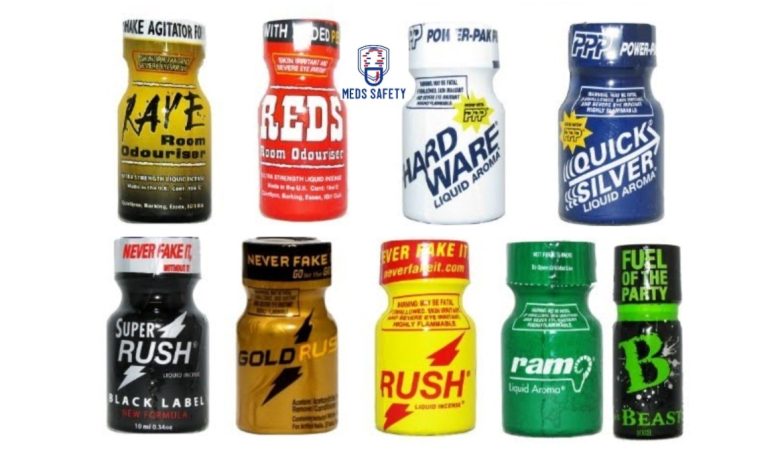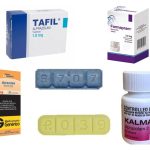Poppers: Uses, Brands, Dangers and Health Risks

What are poppers drugs used for?
Poppers refer to a type of recreational drug that is commonly used for its psychoactive effects. They are inhaled and typically come in small bottles containing a liquid chemical called alkyl nitrites. Poppers are primarily used to produce a short-lasting head rush and intense feelings of euphoria.
Originally, alkyl nitrites were used in medicine as a treatment for angina, a heart condition characterized by chest pain. However, their medical use has diminished over time. Today, poppers are mainly used for their recreational effects and are often associated with the party and clubbing scene.
When inhaled, poppers cause the blood vessels to dilate and relax, resulting in increased blood flow to various parts of the body. This leads to sensations of warmth, lightheadedness, and a rush of blood to the head. Some users report heightened sexual arousal, increased sensory perception, and a sense of disinhibition.
It’s important to note that poppers are potentially hazardous and can pose serious health risks if misused. They should never be consumed orally, as this can be extremely dangerous. Poppers can also cause side effects such as headaches, dizziness, nausea, and skin rashes. Additionally, they can interact negatively with medications like Viagra and other drugs that lower blood pressure.
Historical Background
The history of poppers dates back to the 19th century when amyl nitrite, one of the primary ingredients in poppers, was first synthesized. It was initially developed as a treatment for angina, a condition characterized by chest pain and discomfort due to reduced blood flow to the heart.
In the late 1960s and early 1970s, amyl nitrite began to be used recreationally for its psychoactive effects. People discovered that inhaling the substance produced a brief but intense head rush, euphoria, and increased sensory perception. It gained popularity in the gay community as it was found to enhance sexual experiences and help relax the anal muscles, leading to its association with sexual activities.
Over time, other alkyl nitrites, such as butyl nitrite and isobutyl nitrite, were introduced as alternatives to amyl nitrite. These substances were easier to produce and had similar effects when inhaled. They became popular as poppers and were marketed as room deodorizers, video head cleaners, or leather cleaners to circumvent legal restrictions and regulations.
In the 1980s, concerns about the potential health risks associated with poppers arose. The inhalation of alkyl nitrites was found to have adverse effects on the immune system and could exacerbate certain health conditions. As a result, many countries implemented restrictions and regulations on their sale and distribution.
Today, the sale and use of poppers vary from country to country. They are often sold as legal substances but may be subject to restrictions and regulations, such as age restrictions or labeling requirements. It’s essential for individuals considering the use of poppers to be aware of the legal status and potential risks in their specific location.
Brands Of Poppers Drug
There are several brands of poppers available on the market, although availability and specific brands can vary depending on the region and local regulations. Here are some well-known brands that have been associated with poppers:
1. Rush: Rush is a popular brand of poppers that has been available for many years. It is often recognized by its distinctive logo, which features the word “Rush” in bold, colorful letters.
2. Jungle Juice: Jungle Juice is another widely recognized brand of poppers. It offers a range of different formulas, including Jungle Juice Platinum, Jungle Juice Black Label, and Jungle Juice Plus, among others.
3. Amsterdam: Amsterdam is a brand that offers poppers with different variations and strengths. It is known for its iconic windmill logo and has gained popularity in various parts of the world.
4. Blue Boy: Blue Boy is a brand that has been around for a long time and is known for its potent poppers. It often comes in a blue bottle and has a loyal following among poppers enthusiasts.
5. Locker Room: Locker Room is another brand that offers poppers with different formulas and strengths. It has gained popularity within the poppers community and is recognizable by its
6. Hardware: Hardware is a well-known brand that offers a range of poppers with different strengths and formulas. It is recognized for its industrial-inspired packaging.
7. Iron Horse: Iron Horse is a brand that has gained popularity among poppers users. It offers a strong and potent formula, often associated with intense effects.
8. Pig Sweat: Pig Sweat is a brand that has become popular within certain communities, particularly among the gay leather scene. It is known for its strong and long-lasting effects.
9. QuickSilver: QuickSilver is a brand that offers a variety of poppers with different formulas. It has gained a reputation for its potency and strong aroma.
10. Taiwan Blue: Taiwan Blue is a brand of poppers that originates from Taiwan. It is recognized for its distinctive blue packaging and strong effects.
11. Xtra Strong: Xtra Strong is a brand that emphasizes its high potency and long-lasting effects. It offers poppers with different strengths and formulas.
Remember, the availability of specific brands can vary depending on your location, as regulations and restrictions may differ. It is essential to be informed about the legal status and regulations regarding poppers in your country or region.
The 7 Dangers Of Poppers Drug
The use of poppers can pose various dangers and health risks. Here are some of the potential dangers associated with poppers:
1. Health Risks: Poppers are primarily vasodilators, meaning they relax and dilate blood vessels. This can lead to a drop in blood pressure, which may cause dizziness, fainting, or lightheadedness. Poppers can also cause headaches, nausea, and skin irritations.
2. Inhalation Risks: Poppers are typically inhaled, which can present its own set of dangers. Inhaling the chemical vapors directly from the bottle or excessive inhalation can cause throat and lung irritation, coughing, and difficulty breathing. Accidental ingestion of poppers can be extremely dangerous and potentially fatal.
3. Interaction with Medications: Poppers should not be used in conjunction with medications that lower blood pressure, such as Viagra (sildenafil) and other erectile dysfunction drugs. The combination of poppers with these medications can result in a severe drop in blood pressure, which can be life-threatening.
4. Allergic Reactions: Some individuals may have allergic reactions to the chemicals found in poppers. Symptoms can include skin rashes, hives, itching, and difficulty breathing. If an allergic reaction occurs, immediate medical attention should be sought.
5. Eye and Vision Problems: Poppers can cause temporary changes in vision, including blurred vision, impaired focus, and eye irritation. In rare cases, poppers have been associated with eye damage or vision loss.
6. Dependence and Addiction: While poppers are not considered physically addictive, they can be psychologically habit-forming. Regular use of poppers can lead to dependence and a desire to continually seek the intense rush and euphoria they provide.
7. Impaired Judgment: Poppers can impair judgment and decision-making, which may increase the risk of engaging in risky behaviors or unsafe sexual practices. This can lead to unintended consequences, such as sexually transmitted infections (STIs) or unintended pregnancies.
It’s important to note that the dangers associated with poppers can vary depending on individual factors such as overall health, frequency and amount of use, and interactions with other substances. If you have concerns about poppers or are experiencing any adverse effects, it is recommended to seek medical advice from a healthcare professional.





